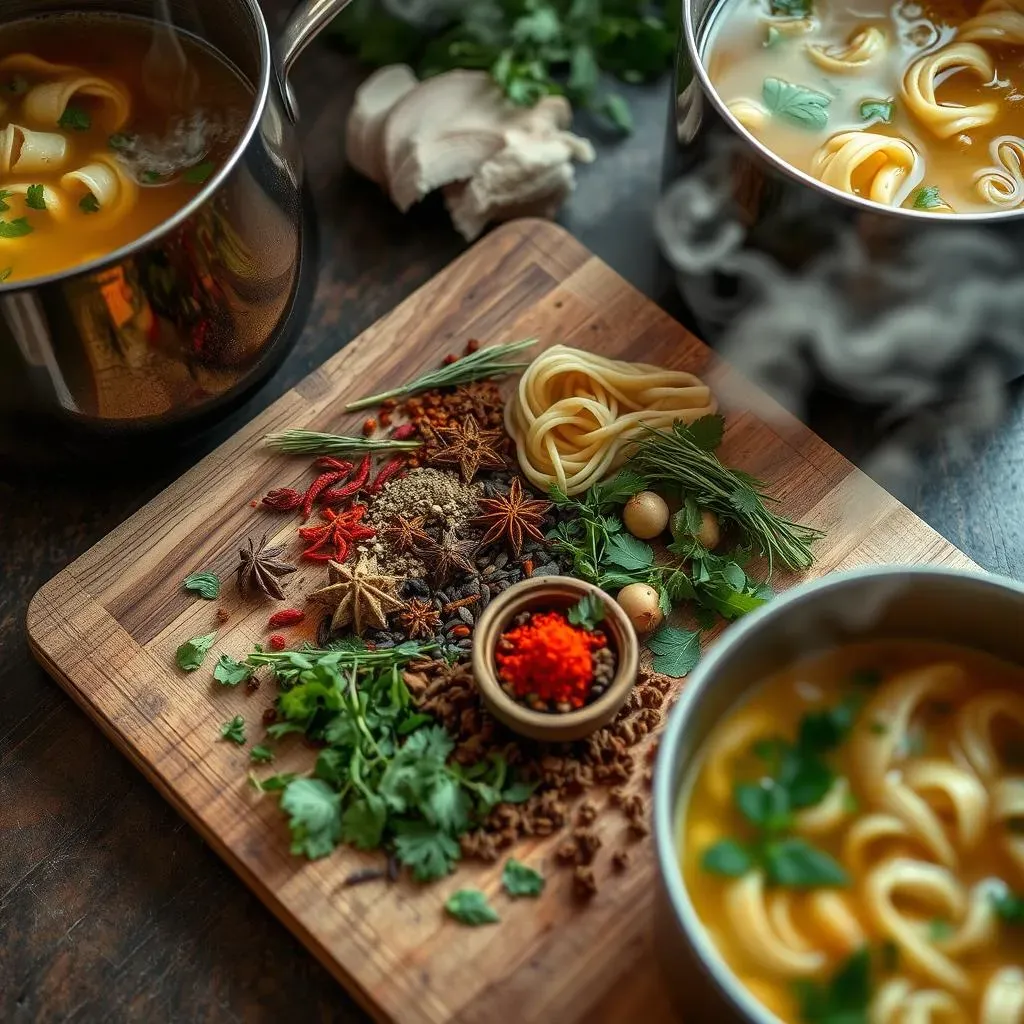Table of Contents
Ever wondered why some chicken noodle soups taste like a warm hug, and others... well, not so much? The secret isn't some magic ingredient, it’s all about the spices! We're not just talking salt and pepper here; there's a whole world of flavor waiting to be unlocked. This article will guide you through the best spices for chicken noodle soup, turning your simple bowl into a culinary masterpiece. We'll start with the basics, explore some exciting herbs, and even touch on a few unexpected additions that will make your soup sing. Forget bland, boring broth; it's time to learn how to build a flavor profile that will have everyone asking for seconds. Get ready to discover how the right blend of spices can elevate your chicken noodle soup to legendary status. So, grab your spoon, and let’s get started on this flavorful journey!
The Foundation: Broth and Basic Seasoning for Chicken Noodle Soup
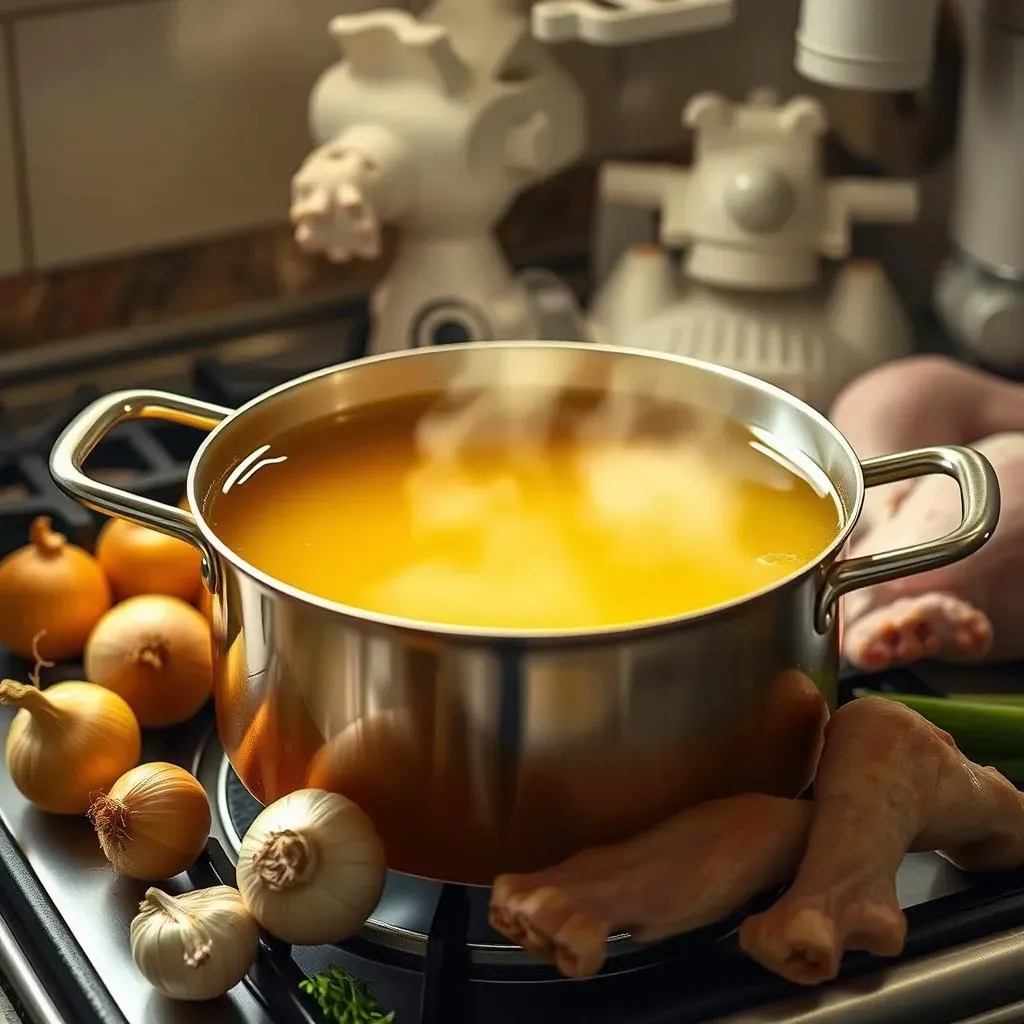
The Foundation: Broth and Basic Seasoning for Chicken Noodle Soup
The Broth: Your Soup's Soul
Let's be real, the broth is the unsung hero of any good chicken noodle soup. It's the base, the canvas, the very essence of what we're trying to create. You can use store-bought, sure, but if you want that extra layer of flavor, making your own is the way to go. Think about it – simmering chicken bones, maybe some veggie scraps, and a few aromatics for hours. It’s like making liquid gold. Don't skimp on the time for this step; it will make a world of difference.
And what about the seasoning? It's not just about salt and pepper. Sure, they're crucial, like the bass and drums in a band, but they need some friends to really make the music happen. We're talking about layering flavors, not just dumping salt in. Think about how much salt you actually need, start small, and taste as you go; you can always add more, but you can't take it away. Don't be shy with the pepper either, a good crack of fresh black pepper can wake up the whole bowl.
Ingredient | Why It Matters |
|---|---|
Homemade Chicken Broth | Deeper, richer flavor; adds depth. |
Salt | Enhances all other flavors; crucial for balance. |
Black Pepper | Adds a touch of spice and warmth. |
Aromatic Allies: Onions, Garlic, and Celery
Now, let's talk aromatics. Onions, garlic, and celery are like the power trio of the soup world. They lay the foundation for all the other flavors to build upon. Dice them up nice and small, and sauté them in a little butter or olive oil before you add the broth. This step is important, it brings out their sweetness and mellows out their sharper edges. Don’t rush this step, let them sweat a bit, and watch them transform into the flavor base of your dreams.
I always like to add a bit more garlic than a recipe suggests, it just adds a punch that I love. The key is not to burn the garlic, burnt garlic will ruin your soup, so keep the heat low and stir it often. Celery, even if you don't love eating it, is a must in the soup for that subtle vegetal note. It's like the quiet friend who brings everyone together, you might not notice it so much, but you will definitely miss it if it's gone.
- Onions: Sweetness and depth.
- Garlic: Pungency and warmth.
- Celery: Subtle vegetal note.
Spice it Up: Elevating Your Chicken Noodle Soup with Herbs
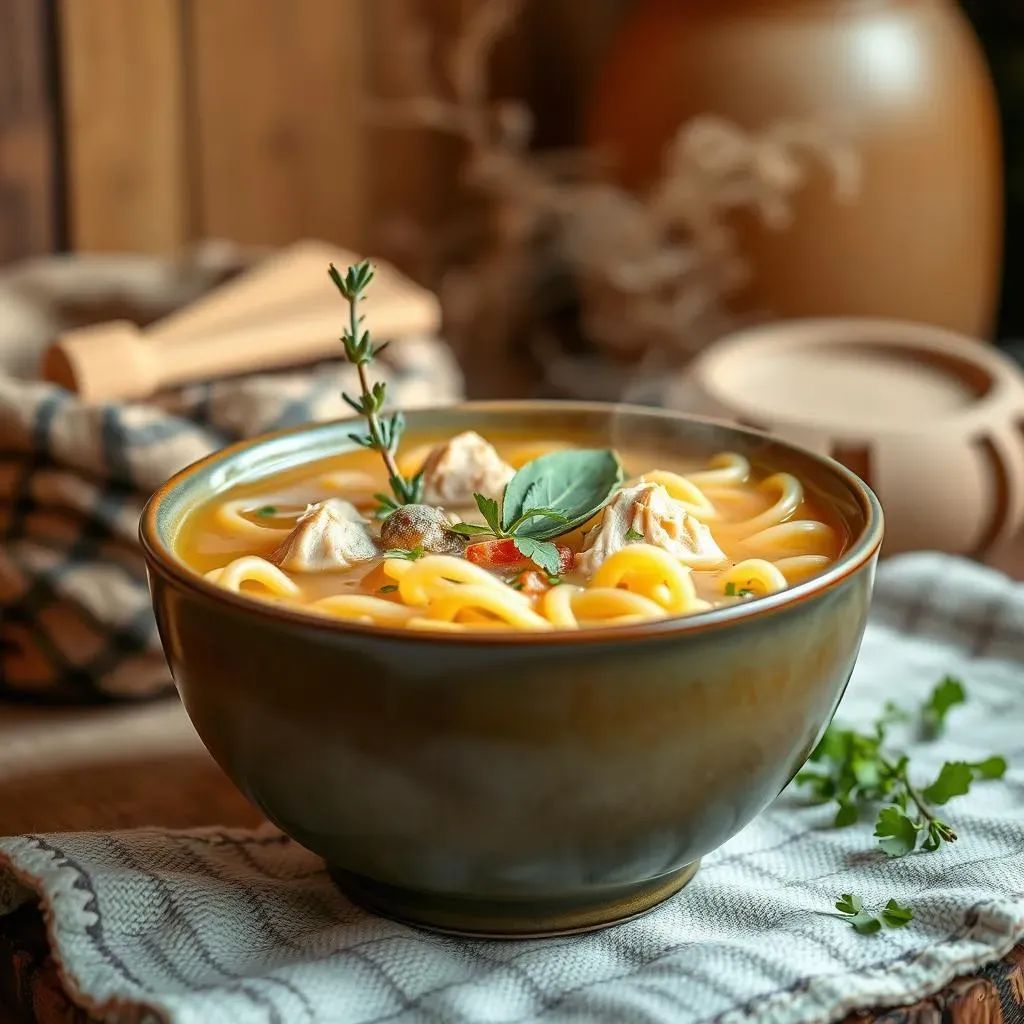
Spice it Up: Elevating Your Chicken Noodle Soup with Herbs
Okay, now we’re moving into the fun part: herbs! This is where your soup can really start to shine. Think of herbs as the lead singer in our band, they bring personality and flair to the whole ensemble. Thyme, for instance, is a classic for a reason. It's earthy, slightly lemony, and it just screams "comfort." A few sprigs of fresh thyme thrown into the pot while it simmers will infuse the broth with a wonderful aroma. If you don’t have fresh, dried thyme works too, just use about half the amount.
Then there's parsley, a bright and fresh herb that's great for adding a pop of green and a touch of bitterness. I like to add a generous handful of chopped fresh parsley right at the end, it keeps its flavor, and it looks pretty too. And let's not forget bay leaves, those little powerhouses that you fish out before serving, they add a subtle depth that you can't quite put your finger on. Remember to take them out before you eat though, nobody wants a bay leaf surprise.
Herb | Flavor Profile | When to Add |
|---|---|---|
Thyme | Earthy, lemony | During simmering |
Parsley | Fresh, slightly bitter | At the end |
Bay Leaves | Subtle depth | During simmering, remove before serving |
Don't be afraid to experiment a little here, either. A little bit of fresh rosemary can add a piney note that's lovely if you like that sort of thing, or some sage can give it a more savory edge. I've even tried adding a pinch of dried oregano or marjoram for a Mediterranean twist. The key is to taste as you go and see what you like. If you are using dried herbs, remember to add them earlier in the cooking process, so they have enough time to release their flavors. Fresh herbs can be added towards the end, to maintain their bright flavor.
A little tip I learned from my grandma: If you are using fresh herbs, tie them up with a bit of kitchen twine, so you can easily remove them after the soup is done. This is especially helpful for herbs like rosemary and thyme, which have woody stems. It's also a great way to keep those pesky bay leaves from playing hide-and-seek in your bowl. It's all about making your soup-making process easier, and more enjoyable. Now you are not just making soup, you are creating an experience.
Beyond the Basics: Other Flavor Boosters for Chicken Noodle Soup
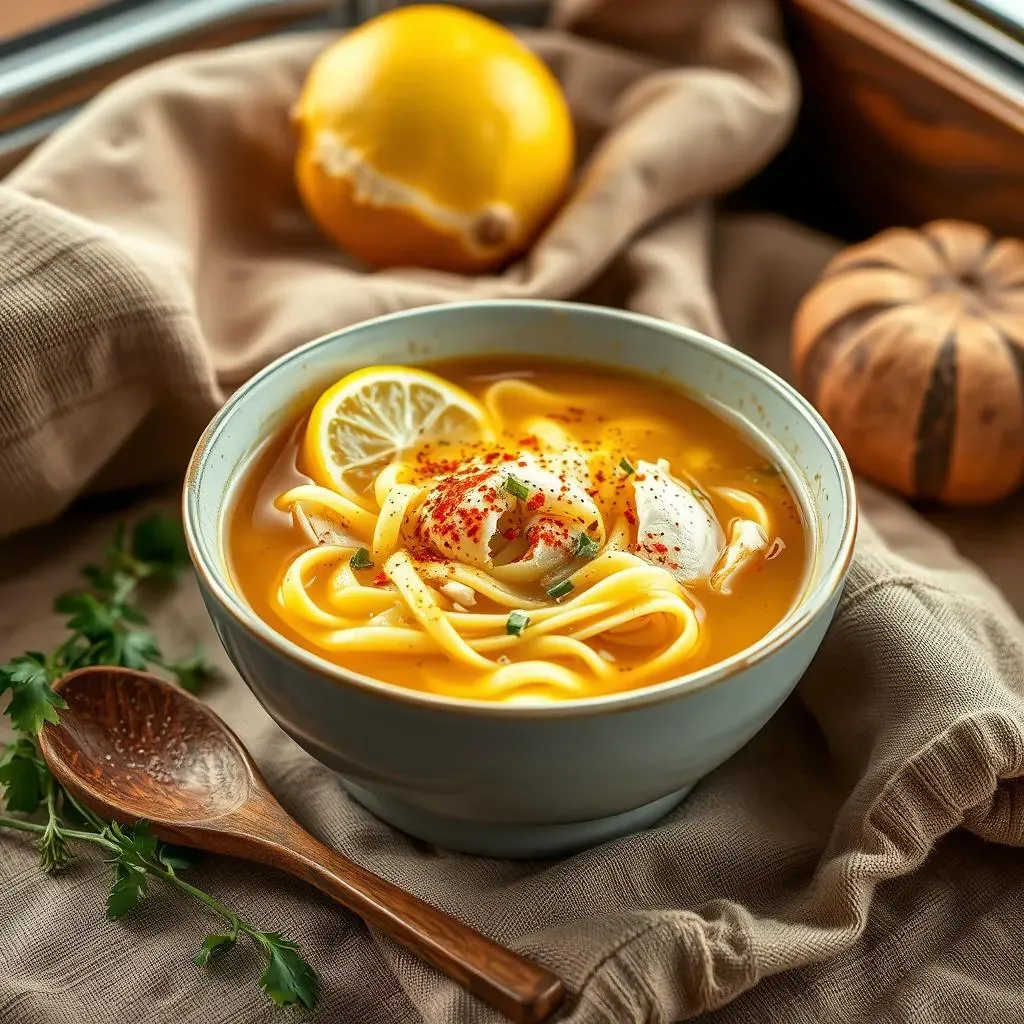
Beyond the Basics: Other Flavor Boosters for Chicken Noodle Soup
Alright, so you've got your broth, your aromatics, and your herbs down. Now, let's talk about kicking things up a notch with some unexpected flavor boosters. I'm not saying you *have* to add these, but if you want to take your chicken noodle soup from "good" to "OMG, what's your secret?", then listen up. First off, a little lemon juice. Seriously, a squeeze of fresh lemon juice at the end can brighten up all the other flavors and add a touch of zest. It's like a tiny ray of sunshine in your bowl. Don't overdo it though, just a little squirt is all you need. I usually do it right before serving, so the flavor stays nice and fresh.
Next up, a pinch of turmeric. Now, I know what you're thinking, "Turmeric? In chicken noodle soup?". Trust me on this one. It doesn't add a strong flavor, but it does add a lovely warmth and a subtle earthiness. Plus, it gives your soup a beautiful golden color, which is always a nice bonus. It's like adding a little bit of sunshine both in color and flavor. It’s not overpowering, but it gives the soup a certain depth that makes it just a little bit more interesting. A dash of cayenne pepper can also do wonders, if you are looking for a little kick.
Flavor Booster | Why It Works |
|---|---|
Lemon Juice | Brightens flavors; adds zest. |
Turmeric | Warmth, subtle earthiness, golden color. |
Cayenne Pepper | Adds a touch of heat. |
And if you really want to get adventurous, consider adding a touch of umami. I’m talking about a splash of soy sauce or a few drops of fish sauce. Don’t worry, it won’t make your soup taste like sushi, it just adds a savory depth that makes the other flavors pop. Start with a tiny amount, like half a teaspoon, and taste as you go. You can always add more, but you can’t take it away. It’s like adding a secret ingredient that elevates everything. I sometimes use a little bit of Worcestershire sauce instead of soy sauce, it depends on my mood. Some people even like to use MSG, but I’ll leave that up to you.
Finally, don't forget the power of a good finishing oil. A drizzle of high-quality olive oil or a touch of sesame oil can add a luxurious touch to your soup. It's like adding a final flourish to a painting. It doesn't just add flavor, it also gives the soup a beautiful sheen. If you want to make it even fancier, try using infused olive oil, like garlic or chili oil. It's all about those little details that make a big difference. Remember, cooking is all about experimentation, so don't be afraid to try new things and see what works for you. And most importantly, have fun with it!
- Soy Sauce/Fish Sauce: Adds umami and savory depth.
- Finishing Oil (Olive/Sesame): Adds richness and sheen.
Tips for Perfecting Your Chicken Noodle Soup Spices
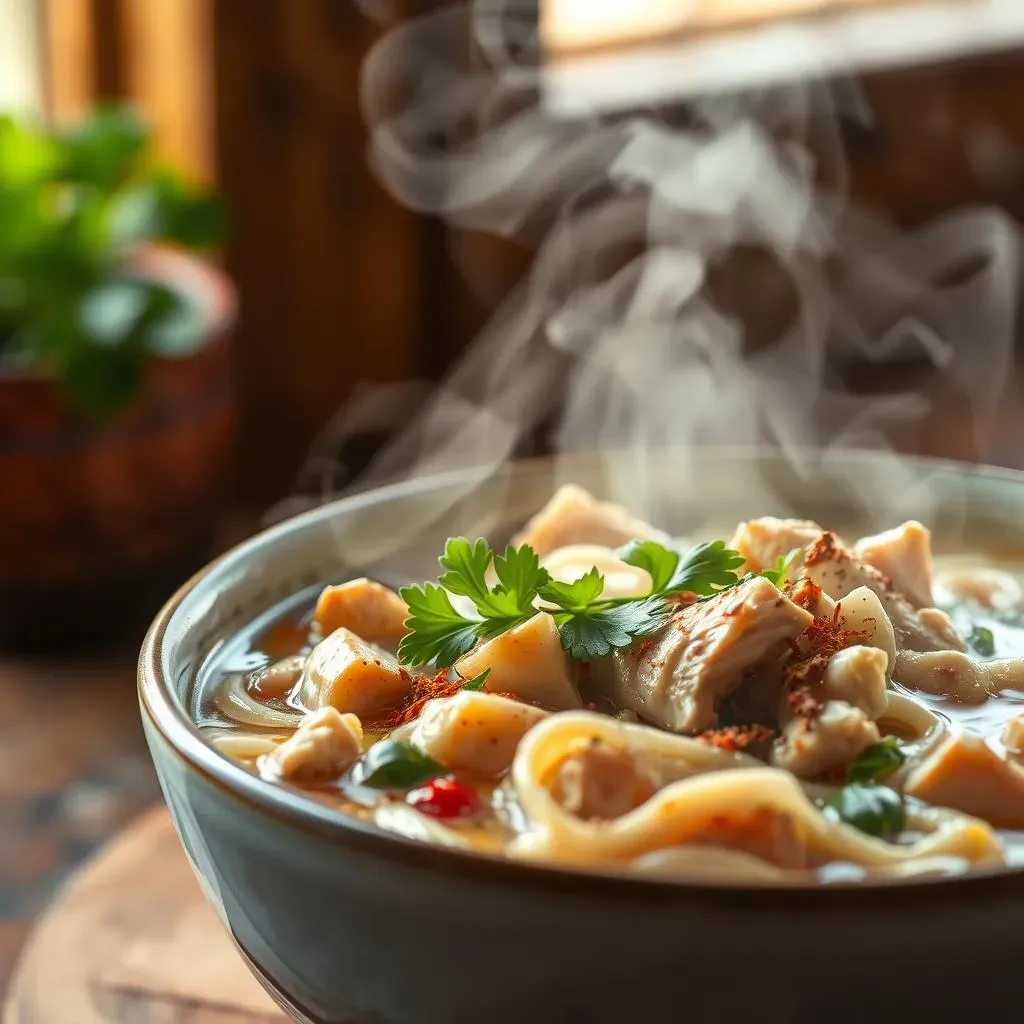
Tips for Perfecting Your Chicken Noodle Soup Spices
Taste as You Go: The Golden Rule
Alright, let's get real for a second, the most important tip I can give you about chicken noodle soup spices is to taste as you go. I know it sounds simple, but it’s a game changer. Don't just dump all the spices in at once and hope for the best. Start with a little of each, simmer, and then taste. Is it missing something? Add a bit more salt, a pinch of thyme, or a squirt of lemon juice. It’s all about finding that perfect balance that suits your taste buds. Remember, you are the boss of your soup, so be the boss and taste everything.
I've had so many soup fails because I didn't taste as I went. One time, I added way too much cayenne pepper, and it was basically inedible. It was like drinking lava, not a pleasant experience. So, learn from my mistakes, be patient, and taste, taste, taste. You will be amazed at how much better your soup will turn out if you do that. It's not a race, it’s a flavor journey. It's like being a scientist in a kitchen, you have to experiment to find the perfect result.
Fresh vs. Dried: Knowing the Difference
Another crucial thing to remember is the difference between fresh and dried herbs. Fresh herbs have a brighter, more delicate flavor, so you usually want to add them at the end of cooking to preserve their freshness. Dried herbs, on the other hand, have a more concentrated flavor and need time to release their flavors, so you want to add them earlier in the cooking process. It's like the difference between a live concert and a recording, they both have their own unique qualities.
For example, if you're using fresh parsley, add it right before serving, so it stays bright green and flavorful. But if you're using dried thyme, add it while the soup is simmering so its flavor can infuse the broth. It's all about knowing how to use your ingredients to get the best results. It's not complicated, it just requires a little bit of understanding. It's like being a chef and knowing when to use a whisk and when to use a spoon. It's all about the nuances.
Herb Type | Flavor Profile | When to Add |
|---|---|---|
Fresh Herbs | Bright, delicate | At the end |
Dried Herbs | Concentrated | During simmering |
